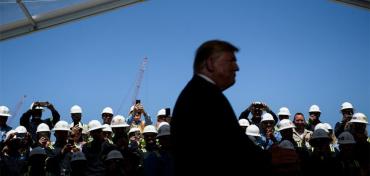
A bill expediting liquefied natural gas (LNG) exports backed by Florida Republicans is building momentum on Capitol Hill.
Back in March, U.S. Sen. Bill Cassidy, R-La., brought out the “Small Scale LNG Access Act” with the support of U.S. Sen. Marco Rubio, R-Fla., and U.S. Sen. John Kennedy, R-La. The companion bill in the U.S. House was introduced by U.S. Rep. Ted Yoho, R-Fla., with U.S. Rep. Michael Waltz, R-Fla., cosponsoring the proposal.
The bill “would expedite the approval of natural gas exports equal to, or less than, 51.1 billion cubic feet per year" which “would be deemed consistent with the public interest and granted without modification or delay.”
This week, the U.S. Senate Energy and Natural Resources Committee passed the bill and sent it to the Senate floor.
“I thank my colleagues on the Senate Energy and Natural Resources Committee for marking up and passing this important bill to expedite approval of small-scale natural gas exports, strengthen an emerging sector of Florida’s economy, and bolster our existing ties with Caribbean and Latin American nations,” Rubio said after the committee passed the bill. “As nefarious actors, including the criminal regimes in Venezuela and Cuba, continue to undermine democracy and commit human rights atrocities in the region, we must ensure they cannot benefit from expedited access to American energy exports.”
“The Small Scale LNG Access Act unleashes the potential of American natural gas, creating good-paying jobs for hardworking families in Louisiana,” Cassidy said.
“Louisiana already leads the world in large-scale LNG exports. Entering the market to export small-scale LNG shipments will lead to even more well-paying jobs for workers,” Kennedy said. “This bill is about creating opportunities for our families in an industry with limitless potential.”
When Yoho introduced the bill back in March, his office offered some insights on what it would do.
“The current permitting process for LNG export facilities is expensive, and small-scale projects often are not cost effective under current conditions,” Yoho’s office noted. “Reducing the time and investment required for small-scale exports will benefit U.S. production, manufacturing, and construction jobs while also reducing trade deficits with the importing country. Increasing LNG exports, even on a small scale, will positively impact the economies of the United States as well as the economies of those receiving U.S. natural gas.”
“With America’s vast natural gas reserves, JAXPORT in North Central Florida is in a position to be a valuable trading hub to meet global demand for Liquefied Natural Gas (LNG) exports,” said Yoho when he unveiled the bill. “At the end of 2018, demand for LNG has seen a sixty-percent increase from what it was in 2017. We must capitalize on the growth of this energy sector. Jacksonville is an ideal location to service the needs of the Caribbean, South America, and the rest of the world with abundant, clean-burning American natural gas. This will not only mean good paying jobs regionally but increased economic benefits for our state economy as well.”
“South and Central American countries have limited alternatives to Maduro’s socialist oil for energy resources,” Waltz said. “This bill makes American liquefied natural gas accessible and cost-effective to regional allies that no longer want to rely on Venezuelan oil.”
While in the upper chamber, the bill is headed to the Senate floor, the legislation has not gained as much traction over in the House. Back in March, Yoho’s bill was sent to the U.S. House Energy and Commerce Committee where it has stayed since then. Waltz is the only cosponsor of the bill in the House.
At this time Florida has no significant natural gas reserves and only a small amount of natural gas production, according to the U.S. Energy Information Administration. All of it comes from the same fields that produce crude oil.
Almost all of the state's natural gas production comes from the Jay Field in the Florida Panhandle, where natural gas withdrawals are used primarily to repressure oil reservoirs to maintain or improve oil production. As a result, less than one-fifth of the state's limited natural gas gross withdrawals are marketed.
Florida's natural gas production peaked in the late 1970s. By 2009, production had fallen to less than 1 percent of the 1978 record high. Despite a brief increase in production early in the current decade, natural gas production is now less than 7 percent of peak production.
Geologists believe additional economically recoverable natural gas deposits may lie offshore in the eastern Gulf of Mexico, but Florida has banned exploratory drilling in state waters in the eastern Gulf. Also, the federal government has placed a moratorium on exploration in federal waters in the eastern Gulf until 2022.
Executive Editor Nancy Smith contributed to this story.


